#flaggs
Text
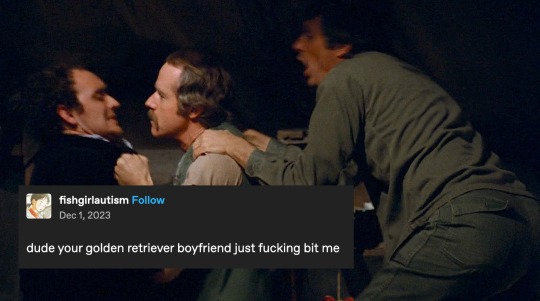
#very politely spaces out the two shitposts by a few minutes for the sake of love and light#as i said hawkeye continues to have a type#bj hunnicutt#hawkeye pierce#hunnihawk#beejhawk#hawkbeej#m*a*s*h#mashposting#mashblogging#rally round the flagg boys#s7e22#my shitposts
1K notes
·
View notes
Text
I think it's fascinating that the quotes:
"Have you forgotten sir, we were at war? A fight with an alien race for the very survival of our species. I feel I must remind you that it is an undeniable, and may I say fundamental quality of man, that when faced with extinction, every alternative is preferable."
"When you spend every day fighting a war, you to demonize your attackers. To you, they're evil, they're subhuman. Because if they weren't, what would that make you? What I'm trying to say... is I've been afraid to see you for what you really are. You're our brothers. Our sisters. And the things we've done to one another are unforgivable."
"These guys want to use us, take us away from our families, and send us all over the dad-gum galaxy just to test if their agents are ready for the big fight? Well... guess I'm interested in showin' em exactly what a big fight is all about! So I'm not ordering you to go. I ain't even asking. You do what you gotta do, Private."
came from the same series whose standard fare is lines like:
"What in the hell are you two doing?" / "We're being executed by our own men, sir." / "Cut it out."
"I only drink the blood of my enemies, and the occasional strawberry yoohoo."
"You always said I could sleep when I’m dead, Sarge, and guess what? I am dead. This purgatory is about to become purga-snore-y, yawn!"
...and both categories manage to be a poignant statement about the nature of war and what it does to the people in it.
#everyone always talks about the more dramatic bits of rvb with the speeches and the 8+ seasons of plot development as the anti-war part#but the comedicization of the violence and death that the characters go through. the tongue-in-cheek gung-ho attitudes.#the way that they're so desensitized to the idea of death or gruesome injury to the point that it's!!! a comedy show!!!#all of that is just as much a statement of the fucked up nature of war!!!#it's like Col. Flagg and Frank Burns in M*A*S*H. they're so simultaneously into and detached from the war and it's a STATEMENT#idk I'm just. thinking about my favourite anti-war media. drawing mash-rvb parallels. and suddenly had to scream about it#might reread the paper on rvb being anti-war media. for enrichment.#not video games#late nights with ali#ali watches rvb#rvb#red vs blue
677 notes
·
View notes
Text
Chrome Browser ist bald Geschichte

Meldungen aus der Fachpresse und von Insidern im Entwicklungsumfeld von Google berichten über eine Lösung die den Chrome Browser überflüssig machen könnte.
Zumindestens für Benutzer von Chromebooks. Das erste was man in der Regel nach dem Einschalten seines Chromebooks macht ist den Chrome Browser öffnen. Und wer sich für ein Chromebook entschlossen hat, dem ist eine Diskussion über Google und Chrome Browser oder Alternativen in der Regel ohnhin Schnuppe. Dazu sind Chromebooks ohnhin zu eng mit dem Google Konto verknüpft.
Schon in der Vergangenheit konnten wir feststellen, dass der Launcher aber ein paar Browser Funktionen bietet bzw. als Schnittstelle für den Browser dient. Über die Suchfunktion lassen sich nicht nur die Anwendungen gezielt aufrufen, die auf dem Chromebook zur Verfügung stehen. Auch in den eigenen Daten und im Web lässt sich suchen. Übrigens nichts was wir von anderen Betriebssystemen nicht auch schon kennen.
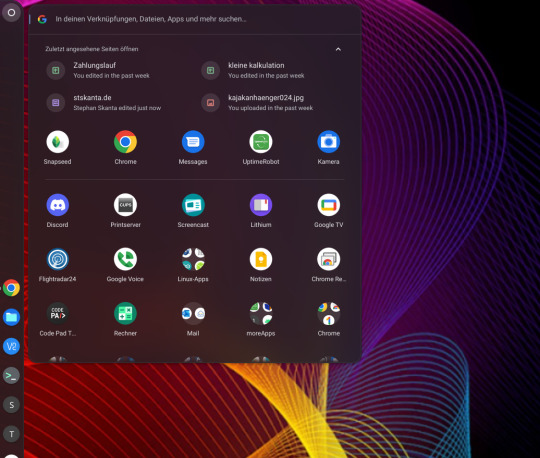
Google hat hier aber letztlich ein enromes Potential noch mehr daraus zu machen. Wie Arbeiten an einer experimentellen Funktion zeigen, versuchen die chromeOS Entwickler nun auch die Bildsuche des Chrome Browsers in dem Launcher zu integrieren. Sicherlich würde es sich später einmal nicht nur auf die Bilder aus dem Web beschränken, sondern auch die Bilder des eigenen Drives und aus dem lokalen Datenspeicher umfassen können.
Sollte das Flag einmal funktionieren dürfte man es sich so vorstellen, dass man im Launcher nach Eingabe eines Schlagwortes auch dort gleich einige Vorschaubilder aus der Browser Bildsuche angezeigt bekommt. Eine der ganz wesentlichen Funktionen die wir aus dem Chrome Browser kennen. Doch es gibt natürlich noch mehr. Aber schauen wir uns zunächst den Launcher etwas genauer an.

Über das kleine Kreissymbol kommen wir zum Chromebook Launcher. Was im Bild oben bei meinem Chromebook links angezeigt wird, wird bei Ihnen ggf. unten angezeigt. Das liegt am Ende nur daran wo man sich die Taskleiste plaziert. Lassen Sie sich davon also nicht verwirren. Geben wir also dann im Launcher Suchfeld bspw. Queen Elisabeth Crusingship ein bekommen wir bereits die ersten Suchergebnisse angezeigt. Ein Klick oder einmal auf die Enter-taste und der Browser öffnet sich mit allen Suchergebnissen.
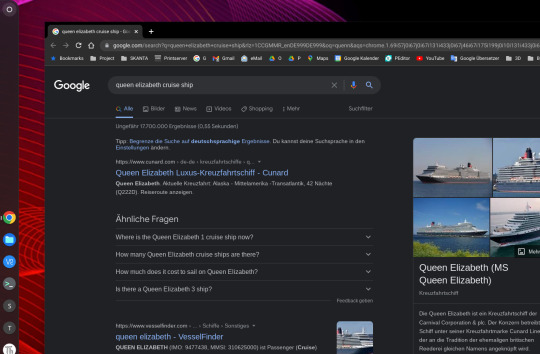
So ist es aktuell schon. Doch in Zukunft könnte es ggf. so aussehen wie das nachfolgende Modell zeigt. Nun wissen wir auch welche immer größere Rolle Progressive Web Apps spielen und das wir bereits einige Anwendungen auf einem Chromebook auch als Desktopanwendung nutzen können. Derzeit bleibt uns noch die Wahl überlassen ob wir dies in der einen oder anderen Form nutzen möchten. Doch der Chrome Browser in der Form wie wir es bislang kennen könnte in Zukunft komplett verschwinden.

Chromebooks würde diese Funktionalität natürlich ganz maßgeblich aufwerten und auch den Benutzern dieser smarten und sicheren Systeme einen wichtigen Vorteil bieten. Ein wesentlicher Schritt für eine höhere Produktivität und efizienteres Anwneden und ein gesteigertes Benutzererlebnis im Umgang mit Chromebooks bzw. chromeOS. Schließlich dürfen wir auch nicht chromeOS Flex vergessen, eine Version von chromeOS welches alte Windows Notebooks zu neuem Leben verhilft.
Es dürfte dann kaum noch den Chrome Browser geben so wie wir ihn heute kennen. Jedenfalls für Nutzer von Chromebooks. Die Verkettung von chromeOS und Chrome Browser wäre dann noch enger und auf einem ganz neuen Level. Auch das dürfte Google sicher gut gefallen und sehr gut in die aktuelle Gesamtstrategie passen. Wir werden sehen wie es weitergeht!
0 notes
Text
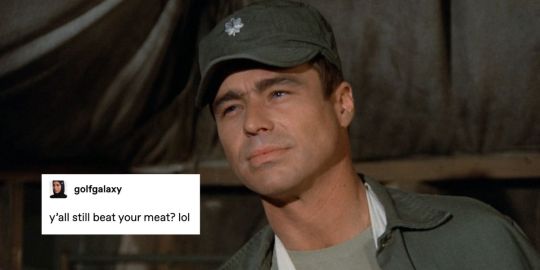

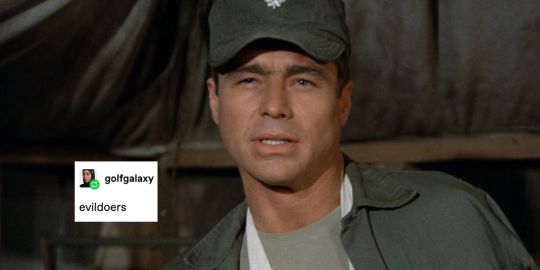
#mash#mashblr#mash text posts#look at my sidebar for more!#mash humor#mash crack#m*a*s*h#hawkeye pierce#trapper john#trapper#hawkeye#trapper john mcintyre#benjamin franklin pierce#piercintyre#hawkeye and trapper#flagg#colonel flagg
878 notes
·
View notes
Text
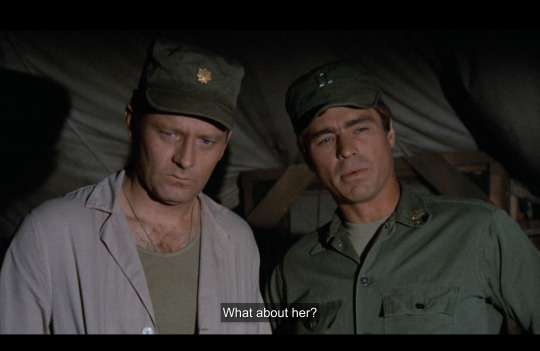


mashgender part 6
bonus:

432 notes
·
View notes
Text

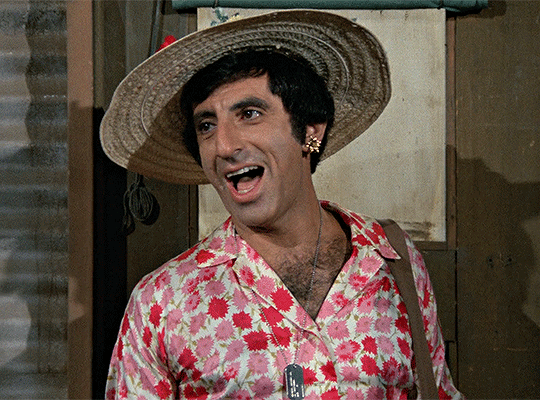
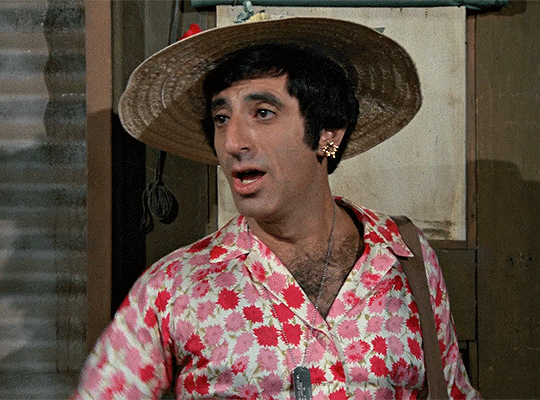
#mash#mash 4077#max klinger#Quo Vadis Captain Chandler#I'm feral about this dress#From a distance I thought that was a rose print but you can see it's a different flower clearly here. Chrysanthemums maybe?#Also I feel like this moment is quintessential Klinger. Beautiful outift. Zero time for Flagg's military bullshit. Wanders off singing :)
444 notes
·
View notes
Text
Hawkeye and Frank are the two most diametrically opposed characters on Mash. They clash politically, ideologically, emotionally, intellectually, and even physically on more than one occasion. There is virtually nothing they agree on. But they do have one significant similarity: both Hawkeye and Frank are notably, pointedly effeminate.
Hawkeye is the central protagonist, so he's written to be likeable, even admirable, especially in the first five seasons of the show when satire dominated rather than character drama. He's the character who makes the correct political points and voices the show's ideology, and male audience members are encouraged to identify with him and aspire to be like him. He's witty, he's smart, he's charismatic, he dodges consequences a lot, he's highly skilled in his work, and he has a strong personality and natural leadership qualities.
Frank is the main antagonist up until the end of season five. He's written for audiences to hate him, mock him, and occasionally be horrified by him. He's dull-witted, incompetent, awkward, easily led and manipulated, and always gets his comeuppance. Few audience members are likely to aspire to be more like Frank Burns.
And yet, while most likeable protagonist/detestable antagonist duos in American popular media would also be differentiated in terms of gender performance as a matter of course - the effeminate villain being a standard stock character, always set against a ruggedly masculine hero - Mash takes a different approach.
From his core personality as a sniveling, weak-willed follower, to the way other characters, including Hawkeye, routinely make fun of him by comparing him to a woman or insinuating that he's gay, Frank Burns certainly fits the part of weak, emasculated villain. What's more interesting, and much less commonly seen in Hollywood media, is that Hawkeye is portrayed as just as unmanly, and just as, if not more prone to having it pointed out in the show.
Often Hawkeye's jokes at Frank's expense include the implication that Hawkeye is attracted to him himself, and not necessarily as "the man." He jokes, "Guess it's a marriage, Frank. I know I can do better, but at my age, can I wait?" in Hawkeye, Get Your Gun; he switches from calling Frank one of his vampire brides to taking the feminine part in post-coital pillow talk after siphoning his blood in Germ Warfare; he kisses or tells Frank to kiss him in Major Fred C. Dobbs, For the Good of the Outfit, and Bulletin Board, etc.
Other times, the jokes Hawkeye makes about himself are virtually identical to the jokes made at Frank's expense - their respective attractions to Margaret as a potentially dominant sexual partner, eg, with both Frank and Hawkeye portrayed as eagerly submissive. For instance, in 5 O'Clock Charlie Hawkeye jokes about tying Frank to Margaret's tent, then dismisses the thought with, "He'd probably love it. I know I would." And Hawkeye/Trapper and Frank/Margaret are sometimes paralleled as dual couples, Hawkeye and Frank usually being framed as the more feminine partner in each.
And of course, unconnected to Frank, there are many, many more examples of Hawkeye's effeminacy, both in jokes and in personality traits.
Hawkeye is a self-professed coward who is loud and proud about how terrified he is to be stuck in a war zone. He's emotionally open and highly empathetic, always willing to listen to others' problems and discuss (or scream about) his own. He abhors institutional violence and faces every enemy combatant with his hands firmly in the air. When authority is thrust upon him he strives to relinquish it, and uses it as little as possible.
More shallowly, he has little interest in sports and exercise, derides masculine hobby magazines like Field and Stream and Popular Mechanics, is incapable of performing mechanical tasks to the exasperation of others at least four times (Comrades in Arms which explicitly frames this emasculating, In Love and War, Patent 4077, and Hey, Look Me Over), mocks traditional masculinity in many ways, and enjoys musical theatre and Hollywood gossip. And he makes and takes literally hundreds of jokes about being unmanly and having sex with men himself, many more than he makes at Frank's expense.
But while the jokes are at Frank's expense and meant to belittle him, they're rarely made at Hawkeye's expense, especially in the first five seasons. Hawkeye doesn't make the jokes out of self-deprecation, he makes them out of pride and a desire to differentiate himself from the army men he's surrounded by. He's almost always in on the jokes others make about him, rather than offended - Potter telling him to file a paternity suit against his rival in Hepatitis makes him laugh delightedly, and Trapper's remarks on his effeminacy, such as Miz Hawkeye in Hot Lips and Empty Arms, are sometimes lightly teasing but always a regular aspect of their dynamic that Hawkeye enjoys playing up. Frank doesn't make any jokes directly mocking Hawkeye's masculinity that I can recall, beyond vague "pervert" and "degenerate" remarks, which, while often historically homophobic, in the show's context tend to be treated as a reference to his heterosexual endeavours.
Frank's effeminacy is a point of mockery and derision, but Hawkeye's is a point of pride, and not intended to make him any less likeable to an audience. Antagonists don't get to score points off of Hawkeye by mocking his feminine traits, but Hawkeye makes fun of Frank regularly by mocking his feminine traits.
This difference in framing can partially be explained by the nature of their respective gender performances.
While Hawkeye and Frank are both effeminate, they're effeminate in many opposite ways. Frank is weak-willed while Hawkeye is strong-willed. Frank is unappealing to most women, while Hawkeye is something of a lady's man. Frank cannot face his fears to rise to a challenge, but Hawkeye can. But on the flipside, Frank refuses to admit to fear while Hawkeye openly proclaims it. Frank strives to attain authority while Hawkeye refuses it or takes it on only begrudgingly. Frank is obsessed with guns to a freudian extent while one of Hawkeye's most famous monologues of the show is a speech about refusing to carry one. Frank worships the concept of traditional masculinity even while he can't perform it himself, while Hawkeye mocks the concept and would refuse to perform it even if he could.
The Sniper is an excellent case study of these contrasts. In this episode, Hawkeye is effeminate and at ease with it, while Frank is desperate to prove himself masculine. Frank and Margaret flirt with strong Freudian overtones while Frank shoots a gun while nearby Hawkeye flirts with with a nurse with a line about "tasting" her. Hawkeye connects with the nurse he's wooing by relating to how scared she is and huddling in fear with her, while Margaret demands that Frank prove his masculinity by going out and taking down the sniper himself. Frank carries a gun while trying to approach the sniper, while Hawkeye carries a white flag. Frank tries to make fun of Hawkeye for wanting to surrender, but he can't bring himself to approach the sniper while Hawkeye does.
This contrast of gender performance is a consistent aspect of Hawkeye and Frank's dynamic throughout the show, but The Sniper makes it a central theme so it's a useful example to show how their relationships to masculinity are a deliberate aspect of their dynamic.
And while Hawkeye makes fun of Frank's femininity, it's significant that he also regularly makes fun of Frank's masculinity - his love of guns (eg The Sniper), his sexual affairs (eg the exchange about Frank as a "fantastic performer" in Yankee Doodle Doctor), his numerous attempts to exert authority (eg Welcome to Korea), his desire for socially approved success (eg Hot Lips and Empty Arms), etc.
Both masculine and feminine sides of Frank are comprised of negative character traits, while Hawkeye embodies the best of both - emotional expression and healthy ways of coping by talking about his feelings; bravery but not machismo; intelligence and skill as a doctor rather than an officer; empathy and a willingness to listen; sexual prowess but largely through his love of foreplay rather than his dick game (which, in the context of the early 70s, is a somewhat feminine attribute that distinguishes him from a typical traditionally masculine man); etc.
Hawkeye demonstrates some of the most appealing and healthy qualities of both masculinity and femininity while Frank demonstrates, or strives to demonstrate, the more toxic qualities of both. Through including a few positive masculine traits in the mix, the narrative is able to depict Hawkeye as likeable, admirable, and desirable in his effeminacy while Frank is depicted as loathesome in his. Hawkeye gets one of many, many women in The Sniper by showing vulnerability, while Frank only appeals to Margaret, and Margaret is portrayed as borderline pathological in her sexual attraction to violent masculinity (the scene where Frank excites her with his gun, for example, also includes an electra complex joke, and there's a running rape kink gag in this episode as well).
Another aspect to consider when it comes to differentiating Hawkeye and Frank's respective femininities is hypocrisy. Similar to how Frank and Margaret's affair is mocked because they can't admit to it while Hawkeye and Trapper's affairs are glorified, part of what makes Frank's effeminacy so mock-worthy, while Hawkeye's feminine qualities are a source of pride and rebellion, is that Frank refuses to admit to them.
Frank desperately wants to be the ideal heroic army man and often play-acts the part, poorly. When Hawkeye mocks him by calling him a woman, for example, he's drawing attention to Frank's failure to live up to his own ideals. And when Hawkeye calls himself a woman, he's mocking those same ideals. The message is that Frank is pathetic not so much for failing to be traditionally masculine, but for wanting to be traditionally masculine at all.
Ultimately the ways Hawkeye and Frank perform masculinity and femininity are pointedly in opposition, from which masc and fem traits they embody, to how proudly they embody them. The show itself draws attention to these gendered similarities and differences between Frank and Hawkeye through a constant barrage of jokes, and even whole scenes and episodes. In this way the show portrays Frank as a hypocritical loser who wants to be masculine but fails to embody all but the worst traits, and Hawkeye as a cool, admirable guy who disdains the traditional pillars of masculinity and embraces his own effeminacy.
#mash#marley on mash#mash gen#mash gs#frank mash#hawkeye mash#since you guys liked that trapper gender meta a lot more than i thought you would here have another one#though this is written a little less formally lol#i have more examples of whole scenes that make these comparisons than just the sniper but i'm trying to keep this from being#even longer than it already is#but eg white gold is another good example wrt how they relate to flagg; yankee doodle doctor; army navy game; george; the gun; etc etc#(also it's interesting that when frank leaves hawkeye gets the pathetic loser portrayal more often... though i think that's a coincidence#the shift from early to late mash could be yet another essay on mash and gender lol)#long post
240 notes
·
View notes
Text
Last night
829 notes
·
View notes
Text

#this is the aforementioned ‘dumb fucking swiftie meme’#if you haven’t seen the original it’s that one person who called her a ‘spineless loser’ for being straight#haphazardly color picking the lesbian flag from some picture of her#i made a bunch of these but this was the best one#mash#hawkeye pierce#trapper john mcintyre#colonel flagg
219 notes
·
View notes
Text
So the German dub is out and I would like to offer up to all of you how it deals with the problem of formal/informal form of address because it's really interesting
(Preface: all of this applies how we as modern people use these forms of address. In the actual 18th century, addressing any adult informally was very uncommon, even between close friends. But we're doing a DJenkins approach here)
(@rocketrouquine wrote about how it is handled in the French dub here; also very interesting!)
The thing to understand about formal vs informal you is that it's about politeness, yes - but that's just a very basic understanding. Yes, you are supposed to be formal with people you don't know, but what they don't teach you in highschool foreign language class are all the things choice of address can communicate. Namely, what distance there is between people. About the closeness of a relationship, what level you're interacting on, about signaling how far you will let a person into your life.
The crew of the Revenge all call each other Du (informal) - except for Stede, who everyone calls Sie (formal). Du is for friends and Stede is not their friend, he is the boss. There is a camaraderie and solidarity among the crew that Stede can't partake in. Sie, in this case, is like a barrier that you put up to keep someone from becoming too friendly with you and reminding them what kind of relationship this is (namely, a purely professional one).
This is underlined by the crew obviously and openly thinking Stede is an idiot - and by Stede calling everyone Du. Is it because he sees himself as a social superior who can address people informally but insists on formal address for himself? That's one way to read it! But more interesting and more accurate, in my opinion, is to read this as an attempt by Stede to make himself part of their ingroup. It's especially obvious when Stede invites Olu and Jim to sit with him on the couch in ep1; he's using Du while Olu very poignantly keeps insisting on Sie. It underlines how visibly uncomfortable Olu is sitting there trying to explain to Stede that people choose a life of crime out of necessity, while making Stede seem even more oblivious and out of place.
Interestingly, Stede uses Sie himself to put some professional distance between himself and someone else. Namely, with the tribe elder from ep2, who he addresses formally. Is this a sign of respect? Sure, he has a tendency to go for Sie by default. But it reminds me more of how one would be per Sie with a doctor or therapist; as a reminder that this is a strictly professional relationship. It's easier to be open and vulnerable with someone who you know isn't emotionally invested in your wellbeing, isn't it?
Stede comes from a background where one is expected to address everyone with Sie unless granted permission otherwise. This is a sign of respect, the same way lower class people on this show tend to use Du as sign of solidarity; on Nigel's ship, all the officers call each other Sie. So when Nigel uses Du with Stede, it adds a layer of disrespect, despite it being perfectly acceptable, since they have known each other as children. This is even more evident with Chauncey, who we see interact more with other pirates; when he wants something from someone (Izzy, Spanish Jackie) he calls them Sie, no problem, while Nigel's crew doesn't even make an attempt at showing some respect at the ep1 tea party.
And then there's Izzy. Izzy and Stede call each other every insult under the sun and also address each other formally the whole time, which is the funniest possible choice. Like. I'm not sure why "Sie Arschloch!" is 1000x more bitchy than "Du Arschloch!" but it just is. It's taking this whole game of distance and closeness to a whole new level; I despise you so much I would never entertain the notion of being friendly enough with you to use your first name. Sie Wichser. It's made even funnier by the fact that for Stede, Sie is much more intuitive than for Izzy. It seems like Izzy has to make a lot more of an effort to keep the Sie up, but he's not gonna be the one to break this particular stalemate first, goddammit.
Finally (because that's the really interesting bit, isn't it) Ed. Initially, in ep3, Stede calls Ed Sie, which, of course he would think to do that while he's laying there half dead and bleeding, I love him. Ed echoes this back, because he's determined to "do this right", make a good first impression, and I thought this would be it, they'd be per Sie until the kiss, like it often goes in media translated from English. Fine, I guess.
But then.
When Ed wakes Stede up, he immediately goes for Du. No warm up, no getting to know each other first at all. And it's great! First of all, because Ed of course is the type of person to just call everyone Du, but also because of what happens next: Stede calls him Du back. This is the first time this particular hand has been extended to him, and oh, is he excited to take it.
(Other people call Stede Du first, Spanish Jackie, the chief, but it's not like this; not an invitation)
Stede isn't meeting Blackbeard, he's meeting some guy named Ed. Someone he instantly makes friends with; someone who has already seen him at his worst and so, who he can be himself with. Someone he doesn't need to put up pretenses or worry about proper behaviour with. This scene would have lost so much had they decided to keep up the Sie.
Remember that camaraderie I talked about earlier? Solidarity among the crew that Stede tries but can't manage to share in? Here it is! Here is the guy who will play dress up with him, who will delight in his interests, who will be his friend.
Yes, sometimes an unprompted Du can be disrespectful. But sometimes it is like this: Hey. I see you. Want to be friends?
#i could have rambled on for hours this is SO INTERESTING to me and they made all the right choices#kudos. praise and kudos.#our flag means death#stede bonnet#edward teach#thoughts#Unsere Flagge bedeutet den TOD 🏴☠️
690 notes
·
View notes
Text

i love everyone who has done this with me i don’t care if we’ve never ever interacted we’re best friends now
#we are a couple of cuties . actually#trapper and hawkeye would do a bit where they’d get mad at each other for not booping#mash#m*a*s*h#mashposting#mash 4077#mashblr#hawkeye pierce#hawkeye#trapper john mcintyre#trapper john#traphawk#hawktrap#piercentyre#piercintyre#colonel flagg#lgbt#lgbtq#boop#boops
222 notes
·
View notes
Text
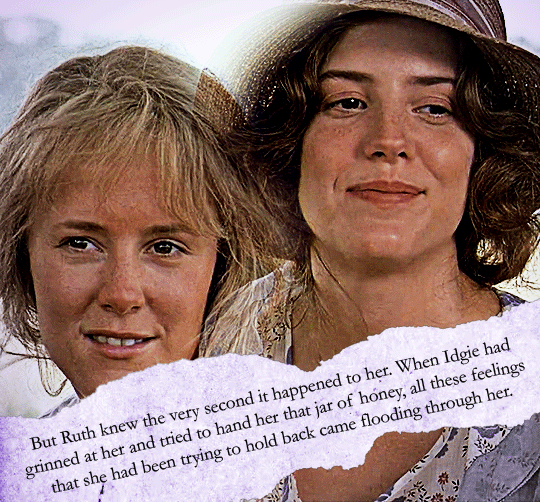

@lgbtqcreators creator bingo: literature
#idgie threadgoode#ruth jamison#idgie x ruth#fried green tomatoes#fannie flagg#wlwsource#userlgbtq#mine#movieedit#filmedit#gifs#filmsource#moviesource
194 notes
·
View notes
Text
Oh this book is so underrated

Feminism!
Lesbianism!
Killing racists!
Amazing friendships between women!
Butchfemme!
1920s/1930s lesbians!
A 1980s depressed housewife being inspired by said lesbians!
Body positivity!
An old woman in an asylum who becomes the only reason why said housewife has a will to live!
Bees!
An incredibly small town!
Trains!
Everyone knows the lesbians are together but literally no one gives a shit, they also raise a kid! And own the Whistle Stop Café!
Cannibalism!
Time skips!
A side character who has casual sex in the 1920s/1930s and doesn’t care what anyone else thinks! (I love you Eva)
A Georgia really religious femme lesbian and an Alabama butch who will fight you!
Disabled rep!
#the movie is good but the book is better#more gay too#and more Evelyn content!#no body no crime#this book is no body no crime#fannie flagg#fried green tomatoes#idgie threadgoode#ruth jamison#idgie x ruth#Evelyn couch#ninny Threadgoode#book recs#butch femme
423 notes
·
View notes
Text

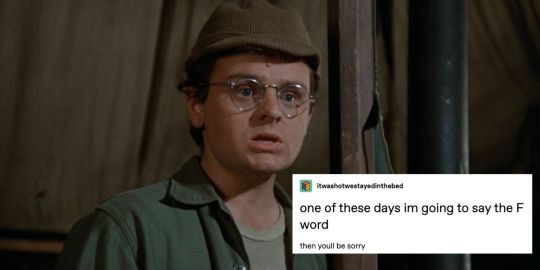
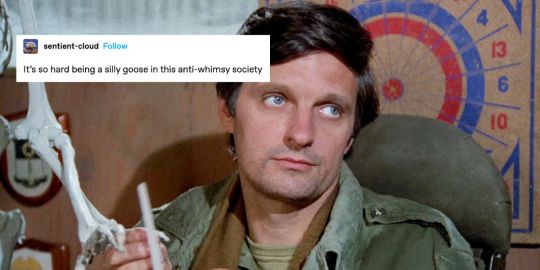
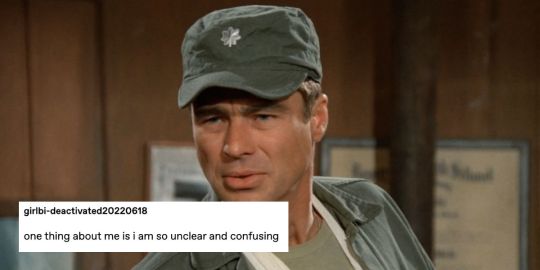
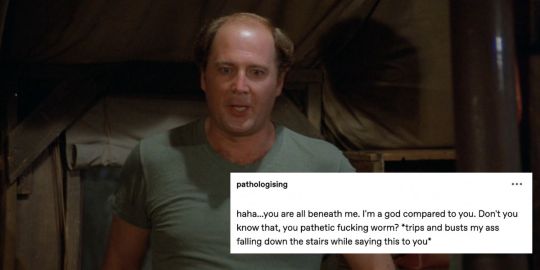
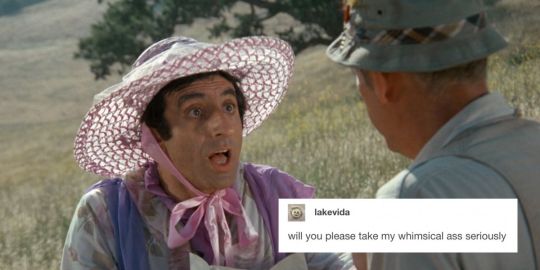

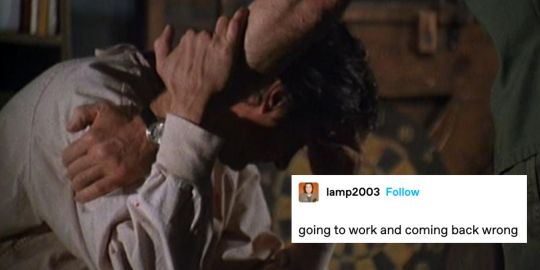
#mash text posts#mash#m*a*s*h#hawkeye#hawkeye pierce#trapper#trapper john#trapper john mcintyre#benjamin franklin pierce#radar#radar o'reilly#klinger#corporal klinger#maxwell klinger#winchester#charles winchester#frank burns#flagg#major charles winchester#charles winchester iii#mash 4077#text posts
1K notes
·
View notes
Text
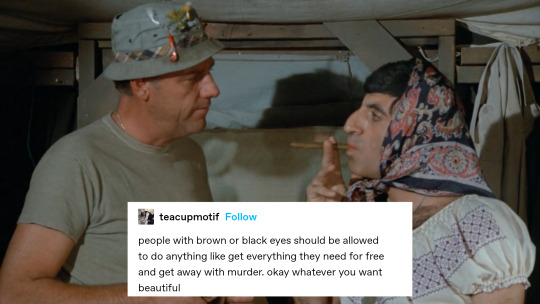
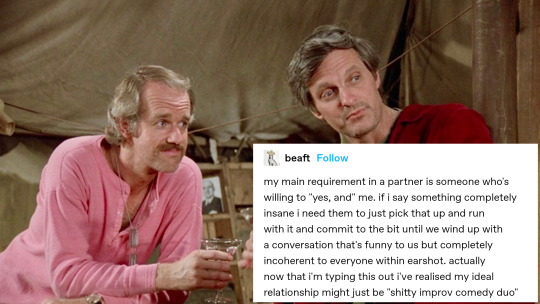

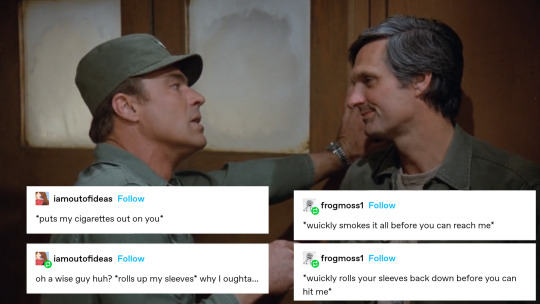


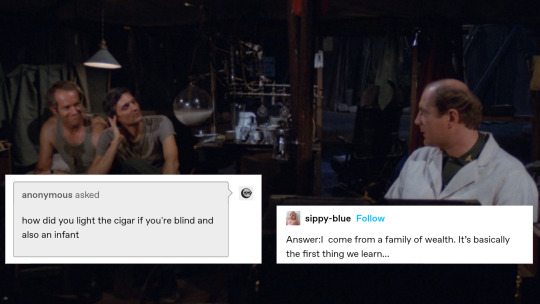

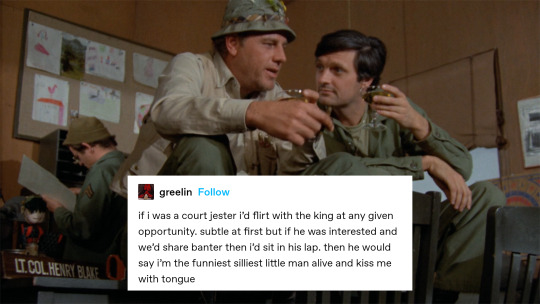

#henry blake#maxwell klinger#bj hunnicutt#Hawkeye Pierce#frank burns#colonel flagg#radar o'reilly#father mulcahy#charles emerson winchester iii#Mashposting#Mash textposts#Mash 4077#Mashblr#Myposting
481 notes
·
View notes
Text
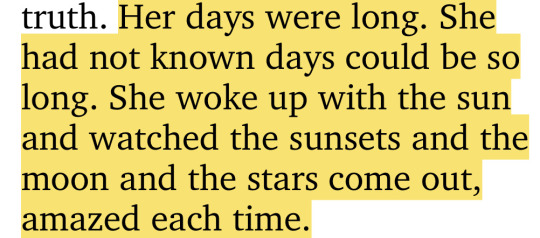
— Welcome to the World, Baby Girl!, by Fannie Flagg
707 notes
·
View notes